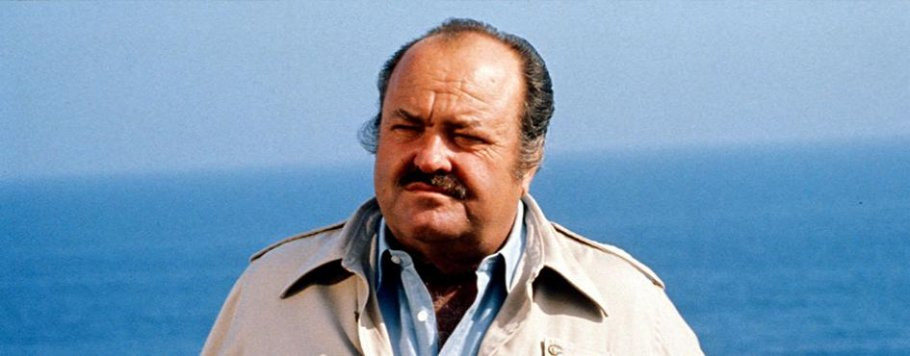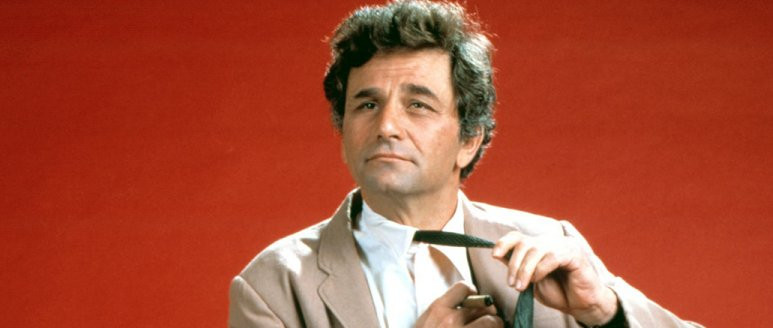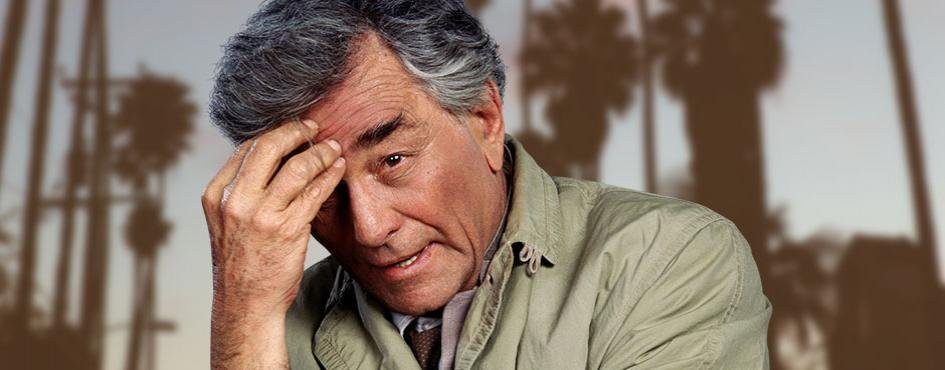
Just One More Thing...The Best of Columbo
I remember, when I was a kid, asking my dad what Columbo’s first name was. My dad suggested Joe but said he wasn’t sure. I was disappointed with this because my dad usually knew everything. Years later, I realised that Columbo had no first name other than Lieutenant and I was pleased because, in those pre-Google days, how could my dad have known that?
I love watching Columbo. I have seen most of the episodes but my three favourites are the ones I remember watching as a kid.
The three are, in no particular order, Negative Reaction, How to Dial a Murder and Double Exposure. I could give chapter and verse on the episode number and the season to which each instalment belongs but I won't because it’s irrelevant. These episodes take me back to a time when I was young enough to think that everything would stay the same.
Negative Reaction stars a bearded Dick Van Dyke as special guest villain. He plays Paul Galesko, a successful and wealthy photographer with a great house, a nosey housekeeper and a nagging wife. He is so distressed by the nagging that he kills her.

He also has a very pretty secretary, Miss McGrath, on the side (and the frisky photographer probably has her vertical and horizontal as well). Miss McGrath is played by Joanna Cameron. Inspector Google's enquiries reveal that Ms Cameron ceased operating in 1980 and this is a shame because she is a pleasure to watch.
Although Columbo is a mystery programme, it is no mystery how Galesko's relationship with his secretary would have started. He would have used a photographer's standard chat up line as his opening gambit, something suitably anodyne, along the lines of 'Why don't you come out with me tonight and see what develops?' Then, as he became more confident, he would move on to the mildly risqué 'Why don't you give me a quick flash?' before descending into outright ribaldry bordering on desperation.
Desperation or no, the secretary was unable to resist his honeyed words and the far from uxorious Mr Galesko has soon bagged himself a trophy mistress with more curves than Brand's Hatch. After the murder Galesko can't wait to escape to the Philippines with her so that he can get in a few undisturbed practice laps.
It is difficult to imagine such a self-possessed, calculating personality as Galesko being nagged by anyone. He hires the services of a newly released convict from San Quentin so that he can set him up as the fall guy after Galesko pretends that his wife has been kidnapped. Whenever I hear the words San Quentin I think of Johnny Cash and, as everyone knows, Cash played a murderous gospel singer in the Columbo instalment Swan Song. Cash was a more than competent actor and I still remember him from Murder in Coweta County, patiently bringing evil Andy Griffith to justice.
Galesko takes his wife to a ranch house, ties her up in a chair, takes some photos as part of the faux-kidnapping plan and then shoots her dead. So that the fall guy can't kiss and tell, so to speak, Galesko lures him to a junkyard and shoots him dead as well. Galesko's plan was to make it look like he was meeting the ex-con to pay off a ransom demand and, so that his story looks convincing, Galesko shoots himself in the leg.
I think we're seeing a pattern here, the moral of which is don't give Mr Galesko a gun or he'll shoot everyone he possibly can with it, including himself. Columbo interviews Galesko in the hospital, takes one look at the powder burns on Galesko's trousers and soon concludes that his story is as unconvincing as the bloke playing the hospital doctor dabbing diffidently at the wound with a piece of cotton wool.
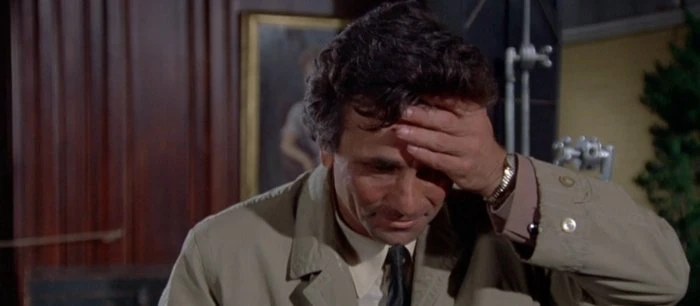
Columbo plays his usual trick of appearing to be stupid whenever he's around the suspect. He does it this time by taking rubbish photos at Galesko's wife's funeral and inviting Galesko to take some snaps at his cousin's twentieth anniversary celebration bash. Because of Galesko's superior photographic knowledge he assumes that he is superior to Columbo in everything. Don't you just hate it when that happens? It was Will Rogers, the font of folksy wisdom, who said that everybody is ignorant, only on different subjects. It is a maxim of which Mr Galesko is unaware and he pays the price at the end by inadvertently incriminating himself when he picks out the camera used to take the pictures of his wife in the ranch house. And, of course, only the killer could have known that.
Not surprisingly for an episode featuring a comedic heavyweight like Dick Van Dyke, it has a couple of funny set pieces but, more surprisingly, neither of them feature him.
There is an obvious joke about one of Columbo's colleagues thinking Columbo has arrived at the junkyard to deposit his car. When questioning a hobo witness at a local hostel, Columbo is mistaken for a vagrant by a well-meaning nun, played by Joyce Van Patten, and given a bowl of stew and a new overcoat. Incidentally, Ms Van Patten turns up again in the Columbo episode Old Fashioned Murder. It's a run of the mill episode but it's redeemed by her appearance as Ruth Lytton, a character aching with sadness and bitterness.
The funniest scene features a wonderful, nervy five-minute turn from Larry Storch. Such appearances are what makes telly watching such a worthwhile and rewarding experience. I will confess right here that I have been a fan of Storch’s broad approach to comedy ever since seeing him in F Troop and the original Ghostbusters ('I'm Spencer, he's Tracy, I'm Kong') both with Forrest Tucker and, in the latter, someone dressed up in a gorilla suit. He has been sadly under used in TV land, at least as far as the UK is concerned, but he has a great time in this scene. He plays it dead straight here and the scene is all the better for it.
It has the feel of improvisation and, although I am not usually a lover of actors without a script (have you witnessed the film Confetti? I know I have), it benefits from Storch's deadpan playing which contrasts with Falk doing his best to keep a straight face as they discuss driving techniques. So unnerved is Storch by Columbo's driving that he decides to get out and walk the rest of the way to the DMV, whatever that stands for.
Of course, the episode could have been a straight up and down instalment, over and done within an hour. The comic interludes pad it out and don't really have any effect on the denouement but I think a good cop show needs a dash of humour to relieve the misery caused by members of the public doing one another in. Storch survives Columbo's unintentional attempts to kill him which means that he fares better than his pal Forrest Tucker. He is bumped off in the episode Blueprint for Murder after threatening to pull the plug on an ambitious architect's schemes for self-aggrandisement.

The architect, played by Patrick O'Neal, goads Columbo into having him dig up part of a construction site so that he can prove that he has not buried the body there. In the end, after digging up the site, the murderous architect deposits the stiff into it so that it can be filled in again with no one any the wiser. Unfortunately for the poor architect, Columbo had been playing him like a cheap mouth organ all episode and he was ready and waiting for the drop.
There was a similar ending to an episode of Tales of the Unexpected about ten years later. In an instalment entitled Never Speak Ill of the Dead, Colin Blakely plays a conniving doctor who strangles his wife played by the ex-Mrs Wolfie Smith Cheryl Hall and buries her in the cellar knowing that it has already been inspected for bodies.
I learned two things from this episode of Tales of the Unexpected. The first one is that Roald Dahl obviously couldn't be bothered that week and cribbed from an old Columbo and the second thing is that I still miss Colin Blakely. He died relatively young in 1987 but he could always be relied on to deliver a quirky, memorable performance.
Talking about quirky, How to Dial a Murder co-stars Nicol Williamson as guest villain. You can’t get much quirkier than this renowned treader of the boards. The early episodes had a liberal sprinkling of British actors as villains. Donald Pleasance, Laurence Harvey and Honor Blackman all came a cropper taking on the deceptive detective. I'll also include in this list former Britons Ray Milland and Roddy McDowall. I would recommend Mr McDowall's episode Short Fuse. It's a middling episode redeemed by its ending but it features Roddy in some of the tightest trousers ever worn by man or beast. I think David Van Day from Dollar must have watched this episode for fashion tips.

Clive Revill gets a mention here as an honorary Briton because I always thought he was British even though he was born in New Zealand. If you lead a busy life and don't have the time to watch the film Pierrepoint, watch Mr Revill's cameo appearance as the same hangman in Let Him Have It. The scene in which he wordlessly sizes up Derek Bentley for the gallows is a very chilly one.
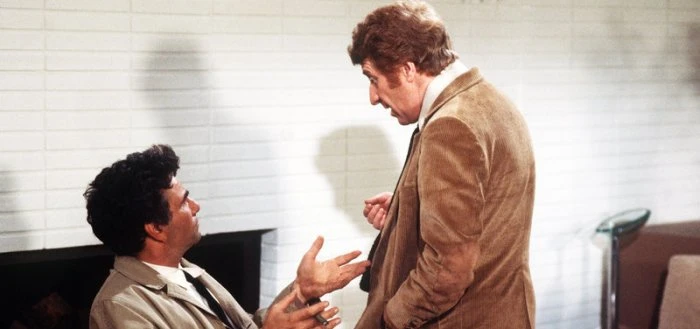
This Columbo concerns Williamson as Dr Eric Mason who lectures on the power of the mind and the benefits that result from controlling it. He trains his two Dobermans, Laurel and Hardy, to kill his late wife's lover by mauling him to death when they hear the word Rosebud. After such a mauling, there is not a drop of blood in sight but this is par for the course for Columbo. The whole of southern California could be massacred by a crazed gunman and the crime scene would still be curiously aseptic.
It is a fair episode enlivened by Williamson and the many film references that the writers have crammed in. Even the title suggests a well-known Hitchcock piece from the early 1950s. The biggest mystery is how Williamson's doctor manages to refrain from pouncing on a nubile Kim Cattrall any chance he gets but it just goes to show how good he is at controlling himself. Miss Cattrall has an underwritten role as one of his students with whom he may or may not be having an affair.
Columbo, of course, has the thing sussed within the first five minutes and neatly turns the tables on the good doctor by deprogramming the dogs so that they lick his face on the command word of Rosebud.
Like fellow Celts Peter O'Toole and Richard Harris, Williamson first made himself known in the swinging sixties and Inspector Google's enquiries reveal that, also like O'Toole and Harris, he was as mad as a hatter. I wouldn’t like to have been his co-star because he sometimes gave the impression that he couldn’t care less. When he put in the effort, though, he was a great actor. I will always be grateful to him for his sterling work as Macbeth in the BBC production from 1983. I was studying it for A-level English Literature and, making use of our new, rented VHS top loader, I watched it countless times in a doomed effort to gain an understanding that I would never acquire. Oh well, you can't put in what God left out, I don't suppose. I came out of A-level English Literature with an E grade and I tremble to think what I would have got were it not for Nicol Williamson's sturdy turn as the doomed Thane of Cawdor.
He never achieved the fame of O'Toole and Harris, but I remember his performances in The Bofors Gun and The Reckoning with pleasure. I first saw the latter film round about the same time as his performance in the BBC's Macbeth and I’m pleased to say that it has had a few recent outings on Talking Pictures. It features an appearance from wrestler Jackie Pallo. I have no memory of Pallo from World of Sport which is ironic for a wrestler billed as Mr TV.
The last time I saw Williamson in TV land was in the mid-1980s as The Last Viceroy, in which he jolly well gave it a go as Lord Louis Mountbatten. I don't think it was his best performance but, never mind, even an off-form Nicol Williamson is more watchable than most other actors I could name.
Double Exposure co-stars Robert Culp as the guest villain. Culp plays Dr Bart Keppel who has given himself the fancy title of motivation research specialist. Keppel has written countless books and made promotional adverts and documentaries all with the aim of telling businessmen how to sell things. He is not as good at his job as he thinks because Mr Norris, his latest client, intends to fire him. Affronted by such a dent to his ego, Keppel does what any good homicidal egotist does and bumps Mr Norris off at a screening while appearing to have a cast iron alibi.
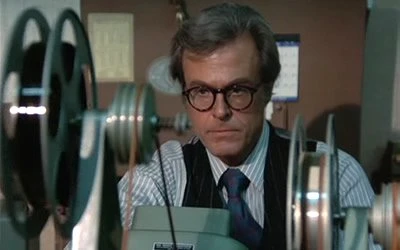
After Norris has eaten plentiful salted caviar, Keppel ensures that he leaves the screening room so that he can quench his thirst by craftily inserting some subliminal shots of a cool, refreshing drink. Keppel slips out at the same time, after having the foresight to continue his narration by a tape-recorded message, and shoots Norris dead. From what I have seen of the way the dead man stuffed his face with the caviar and crackers, it's a fair bet that his gluttony would have seen him off in the not-too-distant future anyway. That's the trouble with homicidal egotists - their homicidal egotism doesn’t allow them to play the long game.
As if Keppel's actions aren't reprehensible enough he implicates the dead man's wife by telling her that her husband has been seeing another woman and sending her off on a wild goose chase so that she has no alibi for the time of the murder.
There's a great scene in which Columbo asks the dead man's wife what type of relationship they had and whether she could tell him what she was doing at the time of the murder. The widow is played brilliantly by Louise Latham, an actress with whose work I am unfamiliar, and she brings a heart-breaking sadness to her short interview with Columbo as, through Keppel's machinations, she is forced to re-evaluate her relationship with her dead husband.
Keppel even bumps off cinema projectionist Roger White who has worked out that he is the killer and wants $50,000 so that he can move into a new home with his mother. That's right, his mother. I would like to have seen more of Mr White because he is played by the estimable Chuck McCann. Big and lumbering, McCann brings just the right amount of dishevelled calculation to the thankless role of the prospective blackmailer who realises too late the type of man he is dealing with.
The scene in which he tries to extort money from Keppel in his office is wonderful to watch, particularly when White holds out his hand for an unreciprocated handshake before leaving the office. For an equally incompetent attempt at blackmail, I would refer the reader to the Jack Cassidy episode Murder by the Book. The lovely, doomed Barbara Colby, as Lily La Sanka, attempts to extort a measly $15,000 from the charming, murderous Cassidy and pays for it with a champagne bottle over the head. Cassidy is a great reminder that one can smile and smile and still be a villain.

Probably because Mr Culp has been up to such tricks before - this is his third outing as the killer - Columbo is on to him straight away. He pursues him in the projection room, he pursues him in the supermarket (in which Culp looks as cool as you like in blue slacks and a yellow blouson jacket) but, best of all, he pursues him on the golf course. This is one the funniest scenes in the whole canon, not least because of the contrast between the untidy ‘tec and the suave, neat Keppel.
Appearing from nowhere in an electric golf buggy, Columbo apologises for ruining his tee shot and commiserates with Keppel on every bad shot he plays. The viewer, along with Columbo, knows that Keppel wants to wrap the golf club round the troublesome policeman’s neck as he comes right out and tells Keppel that he thinks he is guilty of murder.
I think that is why Culp is such an effective actor, particularly in this type of scene. He is skilled at displaying an arrogant restraint that enables him to keep a lid on his emotions. He doesn’t look too bad either but he is narrowly pipped in the fashion victim stakes by Gene Barry in the first ever episode Prescription: Murder. Say what you like about Mr Barry’s acting abilities, the man knew how to wear a suit. He looks as dapper in this as he does in Burke’s Law in which he plays the unlikely role of Amos Burke, a millionaire police captain. I wonder what Columbo would have thought of an immaculately dressed policeman who is chauffeured around town in a Rolls Royce.
At the end, Keppel is hoist by his own petard as Columbo inserts some subliminal shots of his own into a piece of film to induce Keppel to lead him to the murder weapon. Keppel's sudden change of demeanour from complacent self-assurance to humble incredulity is a thing of beauty.
So, these are the three episodes I remember watching as a kid. Surprisingly, none of them involve semi-regular protagonists Patrick McGoohan and Jack Cassidy. There is an excellent one from McGoohan that didn’t make the cut because I don’t remember watching it as a kid.
I watched his superb episode By Dawn’s Early Lightrecently. I am not usually a fan of Patrick McGoohan’s icy interpretations but he puts in an effective, frosty performance as the outdated army officer who bumps off a man wanting to turn his military academy into a co-educational establishment. His scenes with Peter Falk are a joy. It is a strong episode which benefits from the haunting backdrop of the Citadel, a military academy building in South Carolina. It is also good to see father and son Bruce and Bruno Kirby in the same episode.

My dad was a very patient man and I can still remember him answering all of my childish questions. The questions were mainly to do with guns – ‘They have guns in Hawaii Five-O, Dad, why doesn’t Columbo have a gun?’, ‘Will he have a gun next week, Dad?’, Will Columbo shoot someone next week, Dad?’
Now that I am older and less obsessed with guns (I watched far too many westerns when I was younger), one of the many attractions of watching Columbo is that he never carries a weapon. He prefers to use his little grey cells while wearing his little brown mac and eating his little red bowl of chilli.
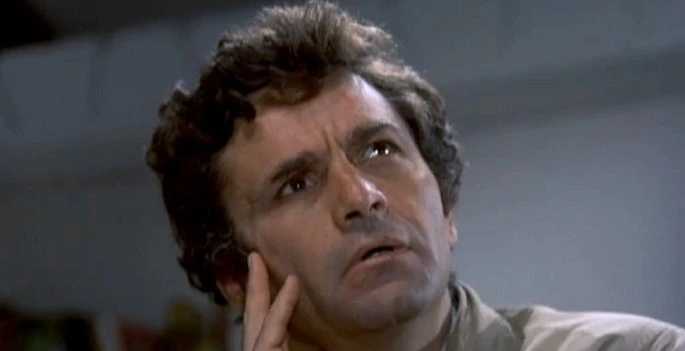
At the end of an episode it would have been time for me to go to bed. I can still hear my mam and dad saying 'It's your bedtime now, young Andrew. Good night and God bless.' These words still have a quiet power. Viewers tend to do a lot of binge-watching now, reducing the notable art of watching TV to a shameful, solitary act. When I think of Columbo I am transported back to a time when watching television was a communal activity, when you had to watch a programme at a certain time or not at all.
I’ve learned a few things since I was a kid but I had to become a father to realise how much my parents loved me. Others, more perceptive than me, come to that conclusion a lot sooner. Columbo was their favourite TV show so, in the spirit of the detective with no first name, there’s just one more thing – good night mam, good night dad. God bless.
Published on March 4th, 2019. Written by Andrew Cobby (2019) for Television Heaven.


